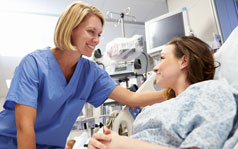10th February 2025
Meet Emily Barwell - Urgent Cardiac Care CNM2
Emily Barwell, Clinical Nurse Manager 2 in Urgent Cardiac Care, plays a pivotal role in supporting and managing the cardiovascular health of patients attending the department. Since stepping into her role in February 2024, Emily has been essential in ensuring high standards of care in urgent cardiac situations. Originally from Australia, she moved to Ireland seven years ago and has even adapted to the country's often unpredictable weather. With her wealth of experience, Emily is dedicated to providing compassionate care to those in need, drawing on her diverse background to make a meaningful impact in the field of cardiac health.
.jpg?sfvrsn=9dc4d345_0)
Can you describe your role? What does a typical day look like? When can patients expect to meet you?
As a Clinical Nurse Manager in Urgent Cardiac Care, my primary responsibility is to deliver high-quality, patient-centred care to individuals presenting with acute cardiac symptoms. My day typically begins with assessing patients, either by phone or in person, and triaging their conditions. I conduct evaluations, work collaboratively with consultants to determine necessary diagnostics, arrange tests, and help devise treatment plans. A significant portion of my role also involves educating patients about lifestyle modifications to reduce their cardiovascular risks.
Patients usually meet me when they arrive at the unit for initial assessment and during their stay for ongoing care. I ensure that patients are informed about their treatment plans before discharge. For some, I may also conduct initial assessments over the phone, especially in urgent cases or for those referred to the unit. Each nurse in our team follows their patients through the entire process, from assessment and diagnostics to collaborating with cardiologists and scheduling tests. Our Urgent Cardiac Care service is available 24/7, ensuring we can provide cardiac care to patients at any time, day or night.
How has your experience at Mater Private been different from your work in Australia?
My nursing experience in Australia, particularly in intensive care, laid the foundation for my clinical expertise. However, since joining Mater Private Network, I’ve been particularly impressed by the strong focus on multidisciplinary teamwork and the access to advanced diagnostics and treatments. The speed with which we can access specialised care here is remarkable, and the hospital’s innovative approach to patient care is unlike anything I encountered in my previous roles in Australia.
Urgent Cardiac Care
Our dedicated service is available to patients who have urgent cardiac symptoms such as chest pain, palpitations or breathlessness.
Learn more.jpg?sfvrsn=f0a336c4_0)
What do you enjoy the most about your role?
I enjoy the autonomy my role provides, along with the collaborative nature of our team. Having always had a strong interest in cardiovascular health, I find it rewarding to make a meaningful difference in patients’ lives, especially in the Urgent Cardiac Care setting. There is a sense of satisfaction in providing timely interventions that not only save lives but also help improve the quality of life for our patients in the long term.
What are the most common conditions you see in Urgent Cardiac Care?
Our Urgent Cardiac Care frequently handles cases involving acute coronary syndrome, cardiac chest pain, arrhythmias (both new and recurrent), heart failure, and complications arising from unmanaged cardiovascular risk factors. We also treat patients experiencing shortness of breath due to cardiac issues.
How can people take better care of their cardiovascular health?
Preventing cardiovascular disease is largely about lifestyle choices. Maintaining a healthy diet, engaging in regular physical activity, avoiding smoking, and managing stress are all key components. For those with known risk factors such as hypertension or diabetes, adhering to prescribed treatments and regular check-ups with their doctor is critical. It is important to be proactive about our health, as small changes can make a big difference in reducing long-term risk.
While we can manage lifestyle factors, we cannot alter family history, which plays a significant role in cardiovascular risk. For patients with a family history of heart disease, it becomes more important to adopt a proactive approach to maintain a healthy lifestyle and mitigate other risks.
.jpg?sfvrsn=4e372880_0)
What do you wish people would know about cardiac-related emergency situations?
The most important thing in a cardiac emergency is time. In situations like heart attacks or cardiac arrest, recognising symptoms early can significantly improve outcomes. Symptoms such as chest pain, shortness of breath, and dizziness should never be ignored. Immediate intervention is crucial, and calling emergency services without delay is essential. For cardiac arrest situations, knowing how to perform CPR (cardiopulmonary resuscitation) and using a defibrillator can dramatically increase survival chances. Early defibrillation and chest compressions are lifesaving, and the goal is to get patients treated within the first 90 minutes to optimise recovery.
How can people be better prepared for cardiac-related emergency situations?
I recommend that everyone take steps to be prepared for potential cardiac emergencies. First, learning CPR and how to use an automated external defibrillator (AED) could save lives in the event of a cardiac arrest. Additionally, people should familiarise themselves with the symptoms of a heart attack and know when to seek immediate medical attention. For those with existing cardiovascular risk factors, it is crucial to maintain a plan with their doctor, ensure they have up-to-date medications, and keep emergency contacts handy. The more informed and prepared we are, the better equipped we are to act quickly when time is most critical.
On our website, you can find a useful guide on how to prepare for a medical emergency at home, including a downloadable emergency checklist to help you ensure you have the necessary details and items at hand.
Mater Private Network Urgent Cardiac Care
Dublin: Tel 1800 247 999 | Opening hours: 24 hours a Day, Every Day
Cork: Tel: 021 601 3326 Email: corkcardiology@materprivate.ie | Opening hours: 8am – 8pm, Monday to Friday
Mater Private Network Emergency Department
Dublin: Tel: 1800 222 999 Email: emergency@materprivate.ie | Opening hours: 8am – 7pm, Every Day
Cork: Tel: 021 601 3333 Email: mpced@materprivate.ie | Opening hours: 8am – 8pm, Monday to Friday







.jpg?sfvrsn=bc97231b_1)


.jpg?sfvrsn=6b411911_1)
.jpg?sfvrsn=51b28ca9_1)
.jpg?sfvrsn=f05de223_1)
